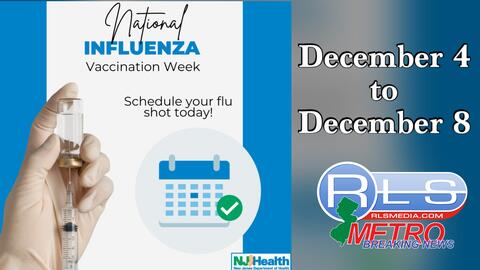By: Richard L. Smith
As respiratory virus season is underway and in observance of National Influenza Vaccination Week, taking place from December 4th to 8th, the New Jersey Department of Health (NJDOH) is emphasizing the importance of staying up-to-date on vaccinations. The NJDOH is urging residents to get their annual flu vaccine, the 2023-2024 COVID-19 vaccine and the Respiratory Syncytial Virus (RSV) shot if eligible.
The NJDOH is urging residents to get their annual flu vaccine, the 2023-2024 COVID-19 vaccine and the Respiratory Syncytial Virus (RSV) shot if eligible.
The Centers for Disease Control and Prevention (CDC) strongly recommend that everyone six months and older receive a yearly flu vaccine.
Acting Health Commissioner Dr. Kaitlan Baston stated, "Flu shots are safe, effective, and the best way to avoid becoming sick, especially if you are pregnant, an older adult, or have underlying health conditions.
Getting your yearly flu shot and the latest COVID-19 vaccine will help keep you healthy during the holidays and the winter season."
Despite the clear benefits of flu vaccination, during the 2022-2023 flu season, only 49.7% of adults (ages 18 years and older) and 69.5% of children (ages six months through 17 years old) in New Jersey received a flu vaccine.
Adults aged 65 years and older, pregnant individuals, and those with chronic health conditions such as asthma and heart disease are at a greater risk of serious complications from the flu.
Additionally, individuals who live with or care for persons at higher risk, including healthcare personnel and households with children under six months of age, should prioritize flu vaccination. In certain healthcare settings, flu vaccination is mandated by state law.
Flu vaccines are available at various locations, including healthcare provider offices, pharmacies, federally qualified health centers, and local health departments.
 Many vaccines are covered by insurers at little to no cost. NJDOH's Vaccine Preventable Disease Program (VPDP) helps reduce economic barriers to childhood vaccines through the Vaccines for Children program, offering free or low-cost vaccines to eligible children through enrolled healthcare providers.
Many vaccines are covered by insurers at little to no cost. NJDOH's Vaccine Preventable Disease Program (VPDP) helps reduce economic barriers to childhood vaccines through the Vaccines for Children program, offering free or low-cost vaccines to eligible children through enrolled healthcare providers.
The VPDP also administers the 317-funded adult program, providing vaccines to uninsured and underinsured adults.
In September, the CDC recommended that everyone six months and older receive the new 2023-2024 COVID-19 vaccines to ensure up-to-date protection against the virus and its variants. The COVID-19 vaccine remains free for most individuals through various programs.
The NJDOH is committed to making flu shots accessible to all residents and supports several community initiatives to promote flu vaccination and prevent severe illness from influenza:
1. The Power to Protect New Jersey Against the Flu campaign, funded by the NJDOH through the Partnership for Maternal and Child Health of Northern New Jersey, emphasizes the importance of flu vaccination and prevention for all residents through a digital toolkit of resources, including shareable graphics and social media messaging.
2. The New Jersey Influenza Honor Roll recognizes institutions that promote flu prevention within their communities, including educational facilities, community-based organizations, businesses, and healthcare facilities. Eligible activities may include flu clinics, flu prevention campaigns, and partnerships with local organizations to promote flu vaccination.
3. The New Jersey College and University Flu Challenge encourages friendly competition between institutions to boost flu vaccination rates among college students. Participating institutions develop unique influenza campaigns tailored to their student bodies.
 For more information on these initiatives and to find COVID-19 vaccination locations, visit the provided resources or call the statewide COVID-19 Vaccine Call Center at (855-568-0545).
For more information on these initiatives and to find COVID-19 vaccination locations, visit the provided resources or call the statewide COVID-19 Vaccine Call Center at (855-568-0545).
For assistance in locating vaccination sites participating in the Vaccines for Children and the 317/Bridge Access programs, visit covid19.nj.gov/vaccines.
